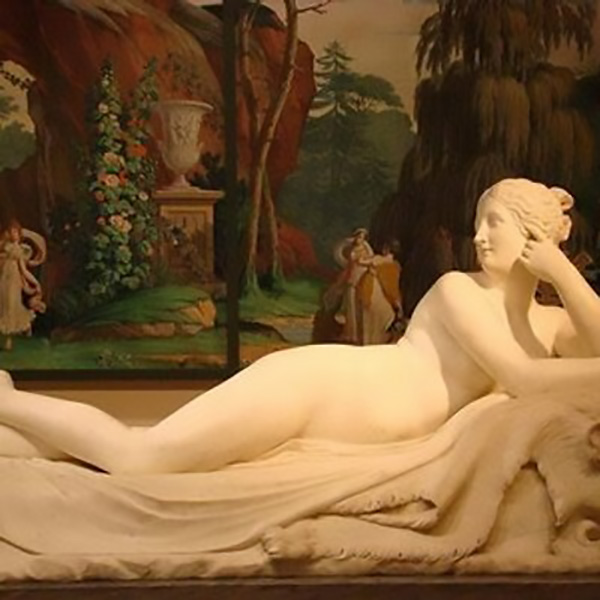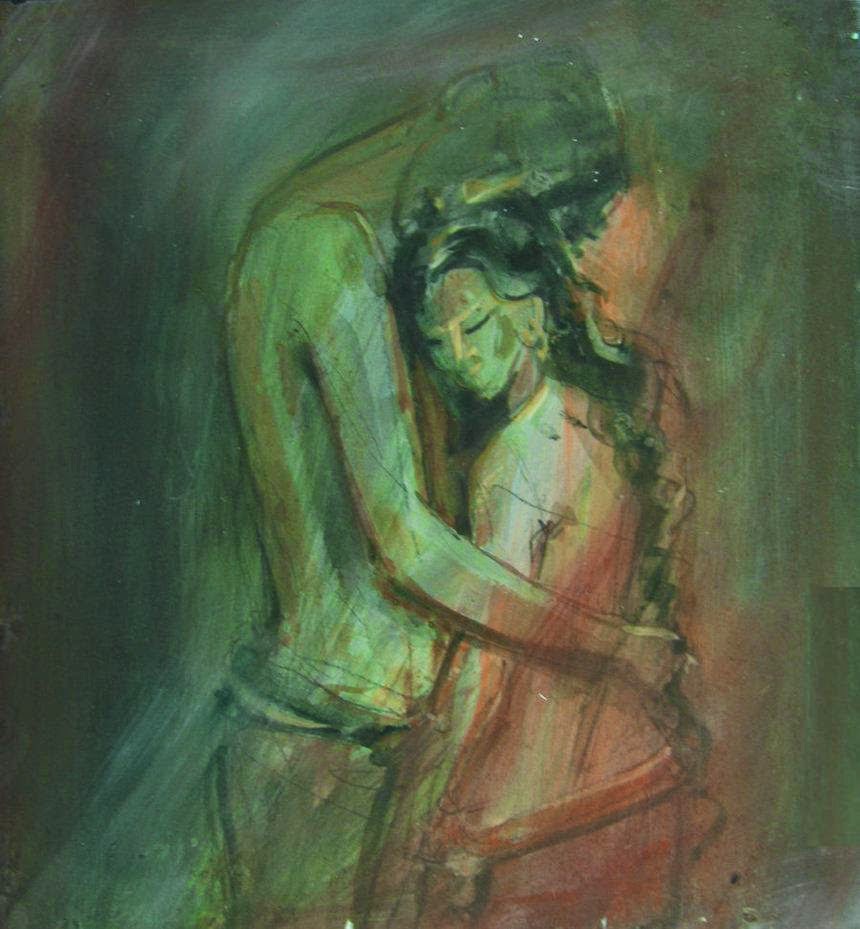Aerope
In Greek mythology, Aerope (Ancient Greek: Ἀερόπη) was a daughter of Catreus, the king of Crete, and sister to Clymene, Apemosyne and Althaemenes. She was the wife of Atreus (or Pleisthenes), and by most accounts the mother of Agamemnon and Menelaus.
In Crete
Aerope's father was Catreus, the son of Minos, and king of Crete. Catreus had two other daughters, Clymene and Apemosyne, and a son Althaemenes. According to the tradition followed by Euripides in his lost play Cretan Women (Kressai), Catreus found Aerope in bed with a slave and handed her over to Nauplius to be drowned, but Nauplius spared Aerope's life and she married Pleisthenes, who was the king of Mycenae.
Sophocles, in his play Ajax, may also refer to Aerope's father Catreus finding her in bed with some man, and handing her over to Nauplius to be drowned, but the possibly corrupt text may instead refer to Aerope's husband Atreus finding her in bed with Thyestes, and having her drowned.
However, Apollodorus tells us that Catreus received an oracle saying that he would be killed by one of his children, so Catreus gave Aerope and her sister Clymene to Nauplius to be sold off in foreign lands (Aerope's brother Althaemenes had found out about the prophecy and fearing that he would be the one to kill Catreus, took Aerope's other sister Apemosyne with him and fled Crete for Rhodes). But Nauplius kept Clymene for himself and Aerope married Pleisthenes, by whom she became the mother of Agamemnon and Menelaus.
In Mycenae
From Crete, Aerope was taken to Mycenae. And there she became, according to most accounts, the mother of Agamemnon and Menelaus. Their father was either Atreus or Pleisthenes, who was Atreus' son, according to some.
For Homer, Agamemnon and Menelaus were the sons of Atreus and Aerope. And although in Euripides' Cretan Women, and the passage by Apollodorus cited above, Aerope was the wife of Pleisthenes, with Apollodorus saying that Pleisthenes was the father of Agamemnon and Menelaus, elsewhere both Euripides and Apollodorus follow Homer. Indeed, most sources do so.
However Euripides and Apollodorus were not alone in making Pleisthenes the father of Agamemnon and Menelaus. These included, so we are told, Hesiod, Aeschylus, Porphyry, and "others".
Bacchylides calls Menelaus both "Atreides" and "Pleisthenides"—meaning a descendant of (usually son of) Atreus and Pleisthenes respectively—in the same poem. It is plausible that Aerope could have first married Pleisthenes and then Atreus, with Atreus adopting the children from the first marriage. And indeed some have asserted just this, though this may simply be an attempt to reconcile separate traditions.

Atreus and Thyestes
While the wife of Atreus, Aerope was the lover of Atreus' twin brother Thyestes, and became involved in their power struggle for the kingship of Mycenea, and blood feud. The story was a popular one in Greek (and Roman) tragedy. Aeschylus' play Agamemnon, contains several obscure allusions to the story, which indicate that, by at least 458 BC, the story was well known. There were several other latter plays, all lost, which presumably also dealt with the story.
We hear of plays by Sophocles, with titles Atreus, Thyestes (possibly more than one), and Thyestes in Sicyon, and by Euripides, with the titles Kressai, and possibly a Thyestes. Agathon, wrote a play titled Aerope (and a Thyestes), and perhaps so did the younger Carcinus. In addition Euripides' Electra, and Orestes, also contains significant references to the story.
Atreus and Thyestes were the sons of Pelops and Hippodamia. Their desire for their father's throne led to the murder of their half-brother Chrysippus, because of which they were banished, and sought refuge in Mycenae. When the Perseid dynasty came to an end, the Myceneans received an oracle saying they should choose a son of Pelops as their king.
Aerope and Thyestes, were lovers and Aerope stole the golden lamb (a portent linked to the kingship of Mycenae) from her husband Atreus and gave it to Thyestes, so that the Myceneans would choose Thyestes as their king.
According to Hyginus, Aerope was the mother by Thyestes of two sons, Tantalus and Pleisthenes, and in Euripides' Cretan Women, it may have been these children that Atreus famously fed to Thyestes.
From Byzantine period annotations to Euripides' Orestes we learn that, in some unspecified Sophocles work, Atreus cast Aerope into the sea in revenge for her adultery and theft of the golden lamb.
Similarities with Auge and Danae
The stories told about Aerope, share elements with those told about Auge and Danae. These elements include, foretold killings, sexual impurity by daughters, and their subsequent punishment by their fathers, by being cast into the sea, or given away to be sold overseas.
Auge was the daughter of Aleus, king of Tegea, and the mother of the hero Telephus. According to one version of the story, Aleus had received an oracle that his sons would be killed by the son of Auge, so Aleus made Auge a priestess of Athena, requiring her to remain a virgin on pain of death. Nevertheless, she became pregnant by Heracles.
Then, by various accounts, she was either cast into the sea, or given to Nauplius to be either drowned or sold overseas, however in all these accounts she ended up in Mysia as the wife of King Teuthras.
Danae was the daughter of Acrisius, king of Argos, and the mother of the hero Perseus. An oracle told Acrisius that he would be killed by the son of Danae, so he locked her away. Nevertheless, Danae became pregnant, by Zeus according to most accounts, and was cast into the sea by her father, but survived through the intercession of Zeus.

Sources
Apollodorus, Apollodorus, The Library, with an English Translation by Sir James George Frazer, F.B.A., F.R.S. in 2 Volumes. Cambridge, MA, Harvard University Press; London, William Heinemann Ltd. 1921.
Aeschylus. Aeschylus, with an English translation by Herbert Weir Smyth, Ph. D. in two volumes. 2.Agamemnon. Herbert Weir Smyth, Ph. D. Cambridge, MA. Harvard University Press. 1926.
Armstrong, Rebecca, Cretan Women: Pasiphae, Ariadne, and Phaedra in Latin Poetry, OUP Oxford, 2006.
Castriota, David, Myth, Ethos, and Actuality: Official Art in Fifth-century B.C. Athens, Univ of Wisconsin Press, 1992.
Collard, Christopher and Martin Cropp, Euripides Fragments: Aegeus–Meleanger, Loeb Classical Library No. 504. Cambridge, MA: Harvard University Press, 2008.
Dictys Cretensis, The Trojan War. The Chronicles of Dictys of Crete and Dares the Phrygian, translated by R. M. Frazer (Jr.). Indiana University Press. 1966.
Diodorus Siculus, Diodorus Siculus: The Library of History. Translated by C. H. Oldfather. Twelve volumes. Loeb Classical Library. Cambridge, MA: Harvard University Press; London: William Heinemann, Ltd. 1989.
Euripides, Electra, Helen and Orestes, translated by E. P. Coleridge, in Volume 2 of The Complete Greek Drama, edited by Whitney J. Oates and Eugene O'Neill, Jr. in two volumes. New York. Random House. 1938.
Gantz, Timothy, Early Greek Myth: A Guide to Literary and Artistic Sources, Johns Hopkins University Press, 1996, Two volumes.
Garagin, M., P. Woodruff, Early Greek Political thought from Homer to the Sophists, Cambridge 1995.
Grimal, Pierre, The Dictionary of Classical Mythology, Wiley-Blackwell, 1996.
Hard, Robin, The Routledge Handbook of Greek Mythology: Based on H.J. Rose's "Handbook of Greek Mythology", Psychology Press, 2004.
Homer, Homeri Opera, five volumes, Oxford, Oxford University Press. 1920.
Homer, The Iliad with an English Translation by A.T. Murray, Ph.D. in two volumes. Cambridge, MA., Harvard University Press; London, William Heinemann, Ltd. 1924.
Homer, The Odyssey with an English Translation by A.T. Murray, PH.D. in two volumes. Cambridge, MA., Harvard University Press; London, William Heinemann, Ltd. 1919.
Hyginus, Gaius Julius, Fabulae in Apollodorus' Library and Hyginus' Fabuae: Two Handbooks of Greek Mythology, Translated, with Introductions by R. Scott Smith and Stephen M. Trzaskoma, Hackett Publishing Company, 2007.
Most, Glenn W., Hesiod II, Harvard University Press, 2006.
Ovid, Ars Amatoria in Art of Love. Cosmetics. Remedies for Love. Ibis. Walnut-tree. Sea Fishing. Consolation. Translated by J. H. Mozley. Revised by G. P. Goold. Loeb Classical Library No. 232, Cambridge, MA: Harvard University Press, 1929.
Pausanias, Pausanias Description of Greece with an English Translation by W.H.S. Jones, Litt.D., and H.A. Ormerod, M.A., in 4 Volumes. Cambridge, MA, Harvard University Press; London, William Heinemann Ltd. 1918.
Plato, Plato in Twelve Volumes, Vol. 12 translated by Harold N. Fowler, Cambridge, MA, Harvard University Press; London, William Heinemann Ltd. 1921.
Maehler, H. Bacchylides: A Selection, Cambridge University Press, 2004.
Servius, In Vergilii carmina comentarii. Servii Grammatici qui feruntur in Vergilii carmina commentarii; recensuerunt Georgius Thilo et Hermannus Hagen. Georgius Thilo. Leipzig. B. G. Teubner. 1881.
McHardy, FIona, The 'trial by water' in Greek myth and literature, LICS 7.1 (December 2008).
Sophocles, Ajax in Sophocles. Ajax. Electra. Oedipus Tyrannus. Edited and translated by Hugh Lloyd-Jones. Loeb Classical Library No. 20. Cambridge, MA, Harvard University Press, 1994.
Sophocles, The Ajax of Sophocles. Edited with introduction and notes by Sir Richard Jebb, Sir Richard Jebb. Cambridge. Cambridge University Press. 1893
Strabo, Geography, translated by Horace Leonard Jones; Vol. 6, Books 13–14 Cambridge, Massachusetts: Harvard University Press; London: William Heinemann, Ltd. (1924).
Thucydides, Thucydides translated into English; with introduction, marginal analysis, notes, and indices. Volume 1, Benjamin Jowett. translator. Oxford. Clarendon Press. 1881.
Smith, William; Dictionary of Greek and Roman Biography and Mythology, London (1873). "Ae'rope"
Webster, Thomas Bertram Lonsdale, The Tragedies of Euripides, Methuen & Co, 1967
Wright, Matthew, The Lost Plays of Greek Tragedy (Volume 1): Neglected Authors, Bloomsbury Publishing, 2016.
"Wikipedia"













